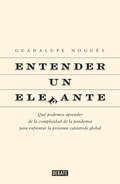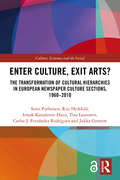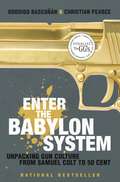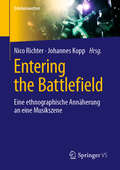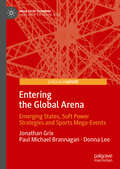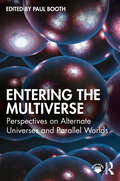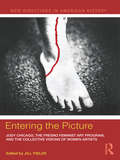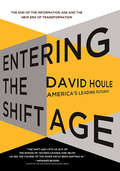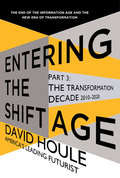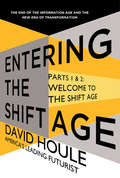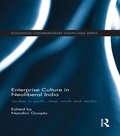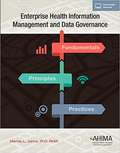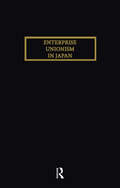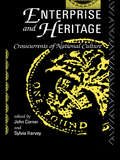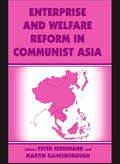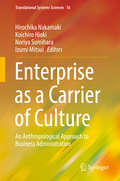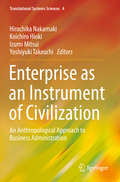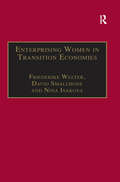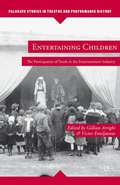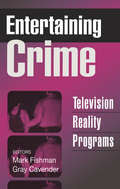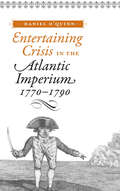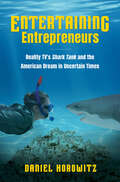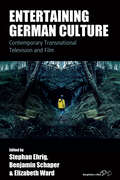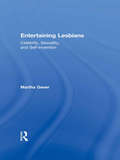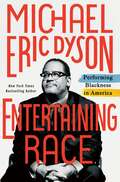- Table View
- List View
Entender un elefante
by Guadalupe NoguésQué podemos aprender de la complejidad de la pandemia para enfrentar la próxima catástrofe global. Al tratar de abordar la complejidad del mundo, su red de causas y efectos, su radical incertidumbre, somos como los ciegos de la fábula, que intentan entender cómo es un elefante con solo tocarlo. La autora disecciona la estructura de los problemas complejos -como lo fue la última pandemia- y propone herramientas para estar mejor preparados en la próxima catástrofe global, que, tarde o temprano -asegura-, llegará. Nos cuesta mucho entender la complejidad del mundo, la red dinámica de causas y efectos que lo constituye, su radical incertidumbre. Al tratar de comprenderla, somos como los ciegos de la fábula, que intentan saber cómo es un elefante con solo tocarlo. La última pandemia nos enfrentó de lleno a un problema complejo, y reveló nuestra natural dificultad de obtener y procesar información cambiante. Guadalupe Nogués disecciona la estructura de esos problemas y describe herramientas para estar mejor preparados en la próxima catástrofe global, que, tarde o temprano -asegura-, llegará. Lejos de acumular respiradores, prepararnos significa mejorar la infraestructura lógica de su abordaje. Y las herramientas que propone son verdaderos superpoderes para hacerlo, indispensables en contextos salvajes e inciertos como los que nos toca atravesar. Un libro con un enfoque científico, social y político, que pone el énfasis en el análisis de los procesos y no tanto en el de los hechos, "porque los hechos no se repiten, pero los procesos sí".
Enter Culture, Exit Arts?: The Transformation of Cultural Hierarchies in European Newspaper Culture Sections, 1960–2010 (CRESC)
by Jukka Gronow Semi Purhonen Riie Heikkilä Irmak Karademir Hazir Tina Lauronen Carlos J. Fernández RodríguezKey debates of contemporary cultural sociology – the rise of the ‘cultural omnivore’, the fate of classical ‘highbrow’ culture, the popularization, commercialization and globalization of culture – deal with temporal changes. Yet, systematic research about these processes is scarce due to the lack of suitable longitudinal data. This book explores these questions through the lens of a crucial institution of cultural mediation – the culture sections in quality European newspapers – from 1960 to 2010. Starting from the framework of cultural stratification and employing systematic content analysis both quantitative and qualitative of more than 13,000 newspaper articles, Enter Culture, Exit Arts? presents a synthetic yet empirically rich and detailed account of cultural transformation in Europe over the last five decades. It shows how classifications and hierarchies of culture have changed in course of the process towards increased cultural heterogeneity. Furthermore, it conceptualizes the key trends of rising popular culture and declining highbrow arts as two simultaneous processes: the one of legitimization of popular culture and the other of popularization of traditional legitimate culture, both important for the loosening of the boundary between ‘highbrow’ and ‘popular’. Through careful comparative analysis and illustrative snapshots into the specific socio-historical contexts in which the newspapers and their representations of culture are embedded – in Finland, France, Spain, Sweden, Turkey and the UK – the book reveals the key patterns and diversity of European variations in the transformation of cultural hierarchies since the 1960s. The book is a collective endeavour of a large-scale international research project active between 2013 and 2018.
Enter the Babylon System: Unpacking Gun Culture from Samuel Colt to 50 Cent
by Christian Pearce Rodrigo BascunanA docu-style investigation of our fascination with the gun, from the perspective of the hip-hop generation.The 2003 shooting death of Toronto community-centre worker Kempton Howard put the spotlight on hip hop's fixation with guns. Media and police soon blamed rap music and its tales of gang life on bullet-ridden US streets for the rising use of firearms in Canadian crime. Were these songs artful accounts of a terrible truth, or a self-fulfilling prophecy?Rodrigo Bascunan and Christian Pearce have interviewed many of the major players in the hip-hop world. As publishers of an award-winning magazine of urban culture, they'd watched rap music become a scapegoat for society's much older and widely spread fascination with guns. What follows is their international adventure to deconstruct modern gun culture in all its manifestations. Bascunan and Pearce seek out hip-hop artists, illegal gun runners, firearms aficionados and manufacturers, museum curators, academics, politicians, video-game creators, activists, victims of gun violence and the family and friends left behind.Somewhere between Fast Food Nation, No Logo and a Michael Moore documentary, featuring sly sidebar material and original artwork, Enter the Babylon System is part outrageous journalistic pursuit and part passionate cri de coeur for sanity in the face of a society's obsession.From the Hardcover edition.
Entering the Battlefield: Eine ethnographische Annäherung an eine Musikszene (Erlebniswelten)
by Johannes Kopp Nico RichterModerne Gesellschaften bestehen aus einer Vielzahl von Lebenswelten. Diese besitzen aber spezifische kulturelle Eigenheiten, die sich einem Verständnis und somit auch einer wissenschaftlichen Erfassung von außen teilweise entziehen. Szenen dienen dabei als hilfreiches Konzept, um diese gesellschaftlich relevanten Gebilde fassbar zu machen. Hierzu bedarf es zunächst einer Annäherung und Beschreibung der kulturellen Eigenheiten aus der Binnenperspektive. Gegenstand des vorliegenden Buches ist die Szene des Heavy-Metal bzw. ihre Manifestation im Rahmen eines Festivals. Mit Hilfe ethnographischer Methoden werden die unterschiedlichsten szenespezifischen Phänomene anhand konkreter Situationen – etwa in den unterschiedlichsten Formen des Campens über ritualisierte Verhaltensweisen, das spezifische Konsumverhalten und die äußere Erscheinung der Protagonisten bis hin zur erstaunlichen Neigung zu beinahe konservativen Wertvorstellungen – beschrieben und untersucht. Zudem soll abschließend in einem Exkurs zu einer gänzlich anderen Szene gezeigt werden, wie viele erstaunliche Parallelen sich hinsichtlich der szenischen Vergemeinschaftung im Allgemeinen finden lassen.
Entering the Global Arena: Emerging States, Soft Power Strategies and Sports Mega-Events (Mega Event Planning)
by Jonathan Grix Paul Michael Brannagan Donna LeeSet against a backdrop of concerns about the potential break-up or radical change to the global world order, this volume sets out to investigate the use of sports mega-events by a number of emerging states.Sports mega-events, it is argued, can be understood as a key component in states’ ‘soft power’ strategies, that is, their attempts to showcase their nations on the international stage, increase their power relative to others via non-coercive means and to increase trade and tourism. Many studies on soft power simply cite the concept’s founder (Joseph Nye) and make little attempt at unpicking the mechanisms behind its creation. This volume does this by shining a light on emerging economies and by putting forward a soft power ‘ideal type’ to aid researchers in understanding the strategies employed by states in advancing their interests.
Entering the Multiverse: Perspectives on Alternate Universes and Parallel Worlds
by Paul BoothThe multiverse has portaled into the mainstream. Entering the Multiverse unpacks the surprising growth of the multiverse in media and popular culture today, and explores how the concept of alternate realities and parallel worlds has acted as a metaphor for centuries.Edited by leading media and popular culture scholar Paul Booth, this collection explores the many different manifestations of the multiverse across different genres, media, fan-created works, and cultural theory. Each chapter delves into different aspects of the multiverse, including its use as a metaphor, as a scientific reality, and as a media-industry strategy. Addressing the multiplicity of multiversal meanings through multiple perspectives and always with an eye toward engagement with contemporary cultural issues, the chapters also examine various distinctions and contradictions, in order to provide a strong basis for further thinking, writing, and research on the concept of the multiverse. Chapters in this collection tell the story of the multiverse in multiple realities: creative nonfiction, academic essay, screenplay, art, poetry, video, and audio essay.A compelling read for students, researchers, and scholars of media and cultural studies, film and media culture, popular culture, comics studies, game studies, literary studies, and beyond.
Entering the Picture: Judy Chicago, The Fresno Feminist Art Program, and the Collective Visions of Women Artists (New Directions in American History)
by Jill FieldsIn 1970, Judy Chicago and fifteen students founded the groundbreaking Feminist Art Program (FAP) at Fresno State. Drawing upon the consciousness-raising techniques of the women's liberation movement, they created shocking new art forms depicting female experiences. Collaborative work and performance art – including the famous "Cunt Cheerleaders" – were program hallmarks. Moving to Los Angeles, the FAP produced the first major feminist art installation, Womanhouse (1972). Augmented by thirty-seven illustrations and color plates, this interdisciplinary collection of essays by artists and scholars, many of whom were eye witnesses to landmark events, relates how feminists produced vibrant bodies of art in Fresno and other locales where similar collaborations flourished. Articles on topics such as African American artists in New York and Los Angeles, San Francisco’s Las Mujeres Muralistas and Asian American Women Artists Association, and exhibitions in Taiwan and Italy showcase the artistic trajectories that destabilized traditional theories and practices and reshaped the art world. An engaging editor’s introduction explains how feminist art emerged within the powerful women’s movement that transformed America. Entering the Picture is an exciting collection about the provocative contributions of feminists to American art.
Entering the Shift Age
by David HouleThe Information Age? Think again. Change is everywhere: how we communicate, what we do for a living, the values we hold, the way we raise our children, even the way we access information. Thanks to a global economy, the force of the Internet, and the explosion of mobile technology, we have--almost imperceptibly--been ushered into a new era, the Shift Age, in which change happens so quickly that it's become the norm. Man-made developments--such as tools, machines, and technology--defined previous ages, but the Shift Age will be defined by our own power of choice. In Entering the Shift Age, leading futurist David Houle argues that we are going through a major collapse of legacy thinking, eroding many of the thought structures that have defined the last two hundred years of humanity. Houle identifies and explains the new forces that will shape our lives--including remote workplaces, the cloud, "24/7" culture, speed-of-light connectivity, creativity, and the influence of Millenials and Digital Natives--for the next twenty years. In this eye-opening book, Houle navigates this pivotal point in human history with clarity and anticipation, focusing on the power of human consciousness and the direct influence we can impart on everything from healthcare to media to education. According to Houle, we are more independent than ever before. We are in control. There's no "going back" to the way things were. Reality is changing ever faster, and ENTERING THE SHIFT AGE is your guide to keeping up.
Entering the Shift Age: The Transformation Decade 2010-2020
by David HouleWe are leaving the Information Age and transitioning into the Shift Age, a time of transformation and change that offers both great risk and incredible opportunity. In Entering the Shift Age, David Houle identifies and explains the dynamics and forces that have shaped our world and will continue to reshape our world for the next 20 years. He shows how the Shift Age means a world fully global yet focused on the individual, where the speed of change is so fast that change itself is the new norm. He also comments from the front lines of the Shift Age on issues and topics that affect our lives, from business and technology to environment, media and global culture. The Transformation Decade ebook examines the fundamental changes going on in 2010-2020 as we transition from the Information Age into the Shift Age, and what you need to be aware of as we navigate these important years.
Entering the Shift Age: Welcome to the Shift Age
by David HouleWe are leaving the Information Age and transitioning into the Shift Age, a time of transformation and change that offers both great risk and incredible opportunity. In Entering the Shift Age, David Houle identifies and explains the dynamics and forces that have shaped our world and will continue to reshape our world for the next 20 years. He shows how the Shift Age means a world fully global yet focused on the individual, where the speed of change is so fast that change itself is the new norm. He also comments from the front lines of the Shift Age on issues and topics that affect our lives, from business and technology to environment, media and global culture. The Welcome to the Shift Age ebook serves as an introduction to the concept of the Shift Age: how we got here, what is changing, and where we are going.
Enterprise Culture in Neoliberal India: Studies in Youth, Class, Work and Media (Routledge Contemporary South Asia Series)
by Nandini GooptuThe promotion of an enterprise culture and entrepreneurship in India in recent decades has had far-reaching implications beyond the economy, and transformed social and cultural attitudes and conduct. This book brings together pioneering research on the nature of India’s enterprise culture, covering a range of different themes: workplace, education, religion, trade, films, media, youth identity, gender relations, class formation and urban politics. Based on extensive empirical and ethnographic research by the contributors, the book shows the myriad manifestations of enterprise culture and the making of the aspiring, enterprising-self in public culture, social practice, and personal lives, ranging from attempts to construct hegemonic ideas in public discourse, to appropriation by individuals and groups with unintended consequences, to forms of contested and contradictory expression. It discusses what is ‘new’ about enterprise culture and how it relates to pre-existing ideas, and goes on to look at the processes and mechanisms through which enterprise culture is becoming entrenched, as well as how it affects different classes and communities. The book highlights the social and political implications of enterprise culture and how it recasts family and interpersonal relationships as well as personal and collective identity. Illuminating one of the most important aspects of India’s current economic and social transformation, this book is of interest to students and scholars of Asian Business, Sociology, Anthropology, Development Studies and Media and Cultural Studies.
Enterprise Health Information Management and Data Governance
by Merida L. JohnsThis book provides the fundamentals, principles, and practices for managing the data asset. Data growth rates are increasing at a phenomenal pace for most businesses. The book tackles how healthcare organizations can manage their data in this era of dramatic data explosion and growing deployment of information technologies. Healthcare organizations must understand that their sustainability and future viability relies on the quality of their data and how they manage this resource on an enterprise-wide basis. This text provides a framework and logical structure to help students understand the components of health information management in a digital era and to provide them with opportunities to develop the necessary skills for performing functions associated with these components. Provides an outline of enterprise-wide information management (EIM) for healthcare. Each chapter incorporates a case study, providing a real-world perspective to student learning and exploring the concepts and interrelationships of EIM and data governance. Students are invited to be a part of the case study through a set of activities at the end of each chapter. Advanced concepts are provided at the end of each chapter for in-depth analysis and study. Aligns with AHIMA core competencies.
Enterprise Unionism In Japan
by Hirosuke KawanishiDuring the 1980s many Japanese began to feel the pressures of ‘internationalizing.’ At the same time, Japanese-style industrial relations came to receive wide international attention. For most people ‘Japanese-style industrial relations’ came to mean the ‘three sacred treasures’: lifetime employment, seniority wages and enterprise unionism. During the 1980s many Japanese began to feel the pressures of ‘internationalizing.’ At the same time, Japanese-style industrial relations came to receive wide international attention. For most people ‘Japanese-style industrial relations’ came to mean the ‘three sacred treasures’: lifetime employment, seniority wages and enterprise unionism.
Enterprise and Heritage: Crosscurrents of National Culture
by John CornerThe phenomena of `enterprise' and `heritage' might at first thought seem unrelated: this book sets out to show that the two concepts are not only related but deeply interdependent. If `enterprise' can be used to define the official encouragement of the values of the market society, then the growth of the heritage industry can be seen as a manifestation of the entrepreneurial spirit - marketing the past so that it is accessible to the man or woman in the street. Using case studies, commentary and critique, the contributors to this lively volume discuss the importance of `enterprise' and `heritage' in British social and cultural life, with examples drawn from film, television, literature, urban planning, architecture, government advertising, information technology and tourism.
Enterprise and Welfare Reform in Communist Asia
by Peter Ferdinand Martin GainsboroughFeaturing a wide geographical scope, this collection of essays surveys enterprise and welfare reforms in all the remaining four Asian communist states: China, Vietnam, Laos and North Korea. Since the collapse of the Soviet Union they can no longer place major reliance upon assistance from other 'fraternal' states and have to devise their own strategies for survival. All have shown a trend towards greater reliance on market forces, though in different ways and to varying degrees. Enterprise management has to adapt to this. In some of them entrepreneurs have become politically and socially acceptable. They may even begin to set trends for social evolution. Yet since state entreprises used to be responsible for all welfare payments to employees and their families, management reforms cannot be separated from those of welfare arrangements. Reducing an enterprise's non-commerical obligations for the sake of greater market efficiency is bound to affect welfare provision. It also reopens the role of official trade unions. How these regimes cope with these conflicting pressures are vital factors in their long-term viability.
Enterprise as a Carrier of Culture: An Anthropological Approach to Business Administration (Translational Systems Sciences #16)
by Hirochika Nakamaki Koichiro Hioki Izumi Mitsui Noriya SumiharaThis book expands anthropological studies of business enterprise to include comparative and interdisciplinary perspectives. A number of books on business anthropology have been published, but most of them are written by anthropologists alone. By contrast, this book engages interdisciplinary studies, e.g., not only by anthropologists but also management scholars and other social scientists. It is the second volume of studies forwarding anthropological approaches to business administration, Keiei Jinruigaku. This volume focusses on the cultural dimensions of enterprise. Here enterprise is viewed as a medium carrying culture, rather than solely an entity of production and management, as is typical in mainstream studies. The approach is based on Tadao Umesao’s definition of culture as a projection of instruments/devices and institutions into the mental/spiritual dimensions of life. Therefore, in our view production and management are among the projections of the cultural aspects of enterprise. This perspective, we believe, constitutes a new frontier in the study of business administration. This book consists of three parts, the first being “religiosity and spirituality”, the second “exhibitions, performance and inducement,” and the third “history and story.” In Part I, Quaker Codes, ex-votos, and spiritual leadership are discussed in relation to management and behavior, and miracles and pilgrimage. Part II describes exhibitions justifying nuclear power industry within power plants in both Japan and England, the exhibition by English families of their porcelain collections, and the performance skills of orchestral maestros. All of these examples indicate that, through the use of narratives and myths, exhibits and performances overtly and covertly induce visitors or audiences to certain viewpoints and emotions. Part III offers examples of histories and stories of enterprise articulated through the branding and consumption of industrial products, and their display in enterprise museums where the essence of culture and heritage is cherished and emphasized, by and for the wider community and the enterprise itself. Conjoined as an interdisciplinary team of Western and Japanese researchers, we apply an anthropological approach to the cultural history of enterprise in both Britain and Japan.
Enterprise as an Instrument of Civilization: An Anthropological Approach to Business Administration (Translational Systems Sciences #4)
by Hirochika Nakamaki Koichiro Hioki Izumi Mitsui Yoshiyuki TakeuchiIn this book, the functions and dynamics of enterprises are explained with the use of anthropological methods. The chapters are based on anthropological research that has continued mainly as an inter-university research project, which is named Keiei Jinruigaku, of the National Museum of Ethnology (Japan) since 1993. These studies have a twofold aim: to clarify that enterprises are not only actors in economic activity but also actors that create culture and civilization; and to find the raison d'être of enterprises in a global society. Business anthropology is an approach to the investigation of various phenomena in enterprises and management using anthropological methodology (e.g., participant observations and interviews). Historically, its origin goes back to the 1920s–30s. In the Hawthorne experiments, the research group organized by Elton Mayo recruited an anthropologist, Lloyd W. Warner, and conducted research on human relations in the workplace by observation of participants. Since then, similar studies have been carried out in the United States and the United Kingdom. In Japan, however, such research is quite rare. Now, in addition to anthropological methods, the authors have employed multidisciplinary methods drawn from management, economics, and sociology. The research contained here can be characterized in these ways: (1) Research methods adopt interpretative approaches such as hermeneutic and/or narrative approaches rather than causal and functional explanations such as “cause–consequence” relationships. (2) Multidisciplinary approaches including qualitative research techniques are employed to investigate the total entity of enterprises, with their own cosmology. In this book, the totality of activities by enterprises are shown, including the relationship between religion and enterprise, corporate funerals, corporate museums, and the sacred space and/or mythology of enterprises. Part I provides introductions to Keiei Jinruigaku and Part II explains the theoretical characteristics of Keiei Jinruigaku. In addition, research topics and cases of Keiei Jinruigaku are presented in Part III.
Enterprising Women in Transition Economies
by David SmallboneEntrepreneurship is a key element in the development of market based economies and one of the potential drivers of change in countries that are in the process of transformation to market based systems. This book describes and critically assesses the nature and extent of female entrepreneurship in European economies that until 1990 were operating under central planning. At the core of the book are 7 country based chapters which provide an overview of the development of entrepreneurship and small firms since 1990, including a review of the institutional and policy context; an assessment of the role of women within the society during the socialist period; and any major changes afterwards. Each chapter also includes a thematic section (each one addressing a different issue) based on unique empirical data drawn from original research.
Entertaining Children
by Gillian Arrighi Victor EmeljanowChildren have been exploited as performers and wooed energetically as consumers throughout history. These essays offer scholarly investigations into the employment and participation of children in the entertainment industry with examples drawn from historical and contemporary contexts.
Entertaining Crime: Television Reality Programs
by Mark FishmanIn eleven original studies by social scientists, this is the first volume to focus on television reality crime programming as a genre. Contributors address such questions as: why do these programs exist; what larger cultural meaning do they have; what effect do they have on audiences; and what do they indicate about crime and justice in the late twentieth century? Adaptable at both undergraduate and graduate levels, Entertaining Crime will contribute to discussions of crime and the media, as well as crime in relation to other issues, such as gender, race/ethnicity, and fear of crime.
Entertaining Crisis in the Atlantic Imperium, 1770–1790
by Daniel O'QuinnHonorable Mention, 2012 Joe A. Callaway Prize in Drama and TheaterFirst Place, Large Not-for-Profit Publisher, Typographic Cover, 2011 Washington Book Publishers Design and Effectiveness AwardsLess than twenty years after asserting global dominance in the Seven Years' War, Britain suffered a devastating defeat when it lost the American colonies. Daniel O'Quinn explores how the theaters and the newspapers worked in concert to mediate the events of the American war for British audiences and how these convergent media attempted to articulate a post-American future for British imperial society.Building on the methodological innovations of his 2005 publication Staging Governance: Theatrical Imperialism in London, 1770-1800, O’Quinn demonstrates how the reconstitution of British imperial subjectivities involved an almost nightly engagement with a rich entertainment culture that necessarily incorporated information circulated in the daily press. Each chapter investigates different moments in the American crisis through the analysis of scenes of social and theatrical performance and through careful readings of works by figures such as Richard Brinsley Sheridan, William Cowper, Hannah More, Arthur Murphy, Hannah Cowley, George Colman, and Georg Friedrich Handel. Through a close engagement with this diverse entertainment archive, O'Quinn traces the hollowing out of elite British masculinity during the 1770s and examines the resulting strategies for reconfiguring ideas of gender, sexuality, and sociability that would stabilize national and imperial relations in the 1780s. Together, O'Quinn's two books offer a dramatic account of the global shifts in British imperial culture that will be of interest to scholars in theater and performance studies, eighteenth-century studies, Romanticism, and trans-Atlantic studies.
Entertaining Entrepreneurs: Reality TV's Shark Tank and the American Dream in Uncertain Times
by Daniel HorowitzThe Great Recession threatened the well-being of tens of millions of Americans, dramatically weakened the working class, hollowed out the middle class, and strengthened the position of the very wealthy. Against this backdrop, the hit reality show Shark Tank premiered in 2009. Featuring ambitious entrepreneurs chasing support from celebrity investors, the show offered a version of the American Dream that still seemed possible to many, where a bright idea and a well-honed pitch could lift a bootstrap business to new heights of success. More than a decade later, Shark Tank still airs regularly on multiple networks, and its formula has sparked imitators everywhere, from elite universities to elementary school classrooms. In Entertaining Entrepreneurs, Daniel Horowitz shows how Shark Tank's version of entrepreneurship disguises and distorts the opportunities and traps of capitalism. Digging into today's cult of the entrepreneur, Horowitz charts its rise from the rubble of economic crisis and its spread as a mainstay of American culture, and he explores its flawed view of what it really takes to succeed in business. Horowitz offers more than a look at one television phenomenon. He is the perfect guide to the portrayal of entrepreneurship in business school courses, pitch competitions, popular how-to books, and scholarly works, as well as the views of real-world venture capitalists.
Entertaining German Culture: Contemporary Transnational Television and Film (Film Europa #27)
by Elizabeth Ward Stephan Ehrig, Benjamin SchaperAudiences for contemporary German film and television are becoming increasingly transnational, and depictions of German cultural history are moving beyond the typical post-war focus on Germany’s problematic past. Entertaining German Culture explores this radical shift, building on recent research into transnational culture to argue that a new process of internal and external cultural reabsorption is taking place through areas of mutually assimilating cultural exchange such as streaming services, an increasingly international film market, and the import and export of Anglo-American media formats.
Entertaining Lesbians: Celebrity, Sexuality, and Self-Invention
by Martha GeverBefore the rise of celebrities like Ellen DeGeneres and k.d. lang, lesbians were rarely in the limelight and the few that were often did not fare well. Times have changed and today's famous lesbians are popular icons. Entertaining Lesbians charts the rise of lesbians in the public eye, proposing that celebrity has never been a simple matter of opening closet doors, portraying "positive images," or becoming "role models." Gever traces the history of lesbians in popular culture during the twentieth century, from Radclyffe Hall and Greta Garbo to Martina Navratilova and Rosie O'Donnell, to explore the paradoxes inherent in lesbian celebrity.
Entertaining Race: Performing Blackness in America
by Michael Eric DysonFrom the New York Times bestselling author of Tears We Cannot Stop"Entertaining Race is a splendid way to spend quality time reading one of the most remarkable thinkers in America today."—Speaker Nancy Pelosi"To read Entertaining Race is to encounter the life-long vocation of a teacher who preaches, a preacher who teaches and an activist who cannot rest until all are set free."—Senator Reverend Raphael WarnockFor more than thirty years, Michael Eric Dyson has played a prominent role in the nation as a public intellectual, university professor, cultural critic, social activist and ordained Baptist minister. He has presented a rich and resourceful set of ideas about American history and culture. Now for the first time he brings together the various components of his multihued identity and eclectic pursuits.Entertaining Race is a testament to Dyson’s consistent celebration of the outsized impact of African American culture and politics on this country. Black people were forced to entertain white people in slavery, have been forced to entertain the idea of race from the start, and must find entertaining ways to make race an object of national conversation. Dyson’s career embodies these and other ways of performing Blackness, and in these pages, ranging from 1991 to the present, he entertains race with his pen, voice and body, and occasionally, alongside luminaries like Cornel West, David Blight, Ibram X. Kendi, Master P, MC Lyte, Ta-Nehisi Coates, Alicia Garza, John McWhorter, and Jordan Peterson.Most of this work will be new to readers, a fresh light for many of his long-time fans and an inspiring introduction for newcomers. Entertaining Race offers a compelling vision from the mind and heart of one of America’s most important and enduring voices.
